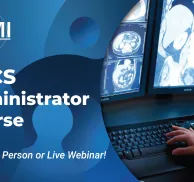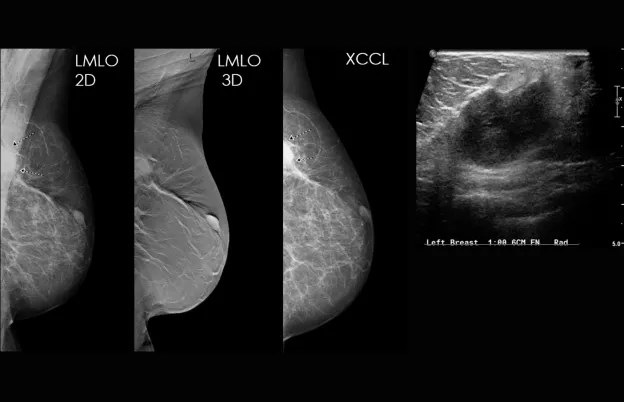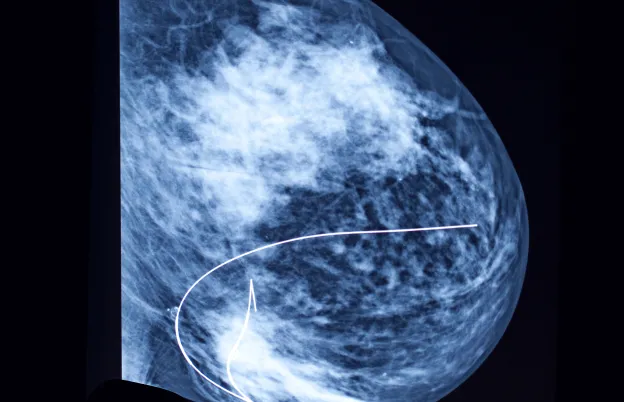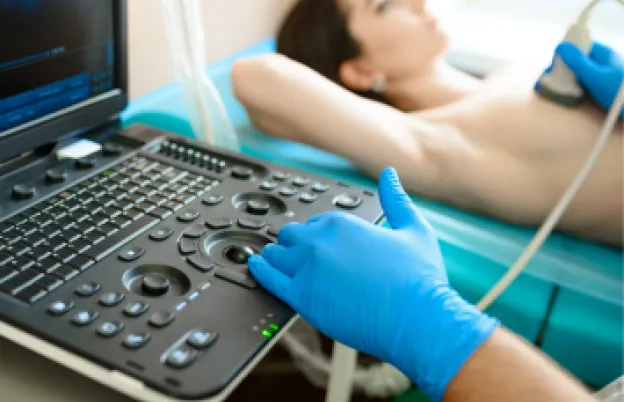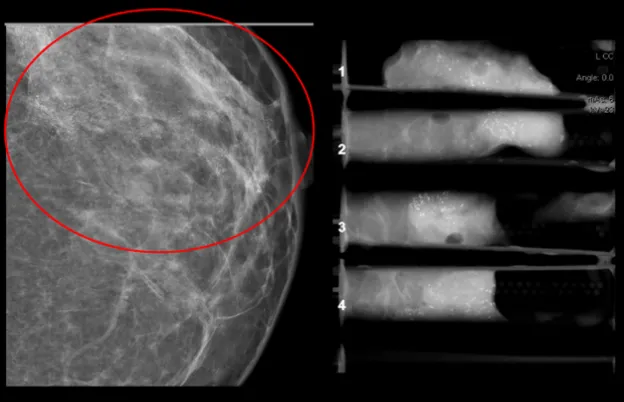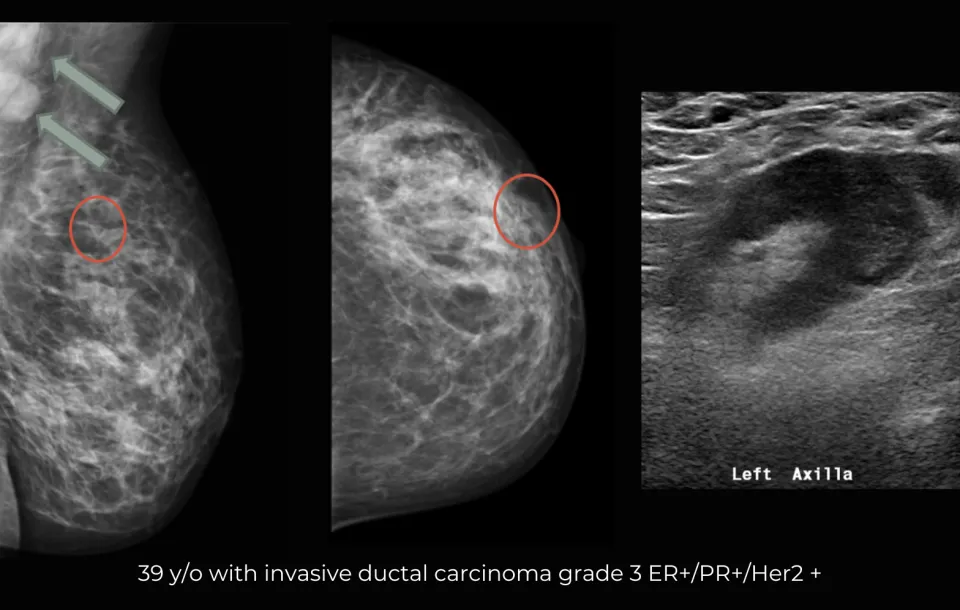
Breast Cancer Staging and Pathology for Mammographers
About this Program
Staging breast cancer patients for the oncologist can be a complicated process. Using multiple breast imaging modalities must be utilized and in correct order. Breast imaging modalities such as mammography, breast ultrasound, breast MRI, breast CT, and breast MBI are possible. Every facility has different protocols for staging breast cancer patients, but there is a standard protocol across the United States. Learning the standard protocol can help to save lives and increase a patient’s survival time with quality of life both mentally and physically.
Linking the lymph node drainage routes can map metastatic breast cancer. Starting with mammography, imaging modalities can enlighten lymph node involvement with intra-mammary lymph nodes. Followed by breast US, breast MRI, and breast CT if necessary. Utilizing multiple imaging modalities can help map the lymph node system of the breast and axillary regions to help stage a breast cancer patient for the oncologist. This process cannot be rushed and must have high skilled technologist to find the hidden lymph nodes, especially ultrasound. Visualizing lymph nodes differently with multiple modalities can reveal the link that has broken the lymph node chain.
Next will be an introduction to pathology diagnosis of breast diseases. Breast pathology reports have immensely changed in the past decade. The input information has become very detailed and pages of what looks like complicated paragraphs with unknown vocabulary. Technologists need to know what to look for in the pathology reports to complete the patient’s history data form.
Educational Objectives
At the conclusion of the course, the participant will be familiar with:
- National breast cancer statistics
- Breast cancer risk factors
- Modalities utilized to stage breast cancer patients
- Exclusive breast imaging modality benefits
- Patient modality imaging flow for breast cancer staging
- Case studies with correlation with multiple modality imaging
- Success stories and meet Delilah
- Anatomy of lymph nodes
- Physiology of lymph nodes
- The five groups of lymph nodes
- Where the lymph nodes drain from the breast through the channel
- What is ENE?
- How the lymph nodes appear in each breast imaging modality
- Biopsies of lymph nodes and marker clip placement
- Breast staging process of the lymph node chain
- What is the treatment for positive lymph nodes?
- How many lymph nodes need to be removed?
- Sentinel nodes testing and mapping
- Case studies with multiple breast imaging modalities
- Lymph node diagnosis in pathology reports
- Pathology history
- What degree of education does it take to become a pathologist?
- What pathologist specialty is needed to examine breast cells and tissue?
- What has to be on a pathology report?
- Vocabulary terminology for breast surgeries
- How many different types of mastectomies are there?
- What decides clean margins for breast specimens?
- Radiologist reports on large and small breast specimen imaging
- Case studies with pathology reports from different types of breast surgeries
Schedule
What this course will cover
- Imaging Flow for Breast Cancer Staging
- American Cancer Society
- Breast Cancer Risk Factors
- Patient Imaging Flow
- Supported Mammography Programs
- Patient Study Cases with Multiple Imaging Modalities
- Meet Delilah (breast cancer survivor)
- Linking the Lymph Node Chain
- Anatomy
- Physiology
- Groups of Lymph Nodes
- Extranodal Extension (ENE)
- Appearance
- Biopsies
- Treatment for Positive Lymph Nodes
- Sentinel Nodes
- Diagnosis in Pathology Reports
- Breast Cancer Pathology
- Pathology History
- Education Degree for Pathologist
- Tools Used
- Surgical Pathologist
- Types of Breast Pathology Reports
- Pathology Scoring System
- Dissescting Pathology Reports
Audience
Who should attend?
This webinar is for all mammographers.
Program Faculty
Meet your presenter(s)

Deborah Davis
MSRS, RT(R)(M)(QM)
Deborah Davis has been a mammographer for almost 30 years. She was a lead mammographer at MD Anderson Cancer Center for over 25 years. Performed diagnostic and screening exams, stereotactic breast biopsies, breast localizations, executed quality control, and mobile mammography. She retired in December 2023, but works part time. Deborah has taught continuing education in mammography since 2006, and has been with MTMI since 2020. Deborah created a mammography curriculum at the University of Texas MD Anderson School of Health Professions and lead the program for four years before retiring. She continues to teach portions of the initial mammography program including digital breast tomosynthesis 8-hour requirement. She also teaches several other mammography continuing education courses. Breast health is her compassion and she continues to share her experiences and knowledge to allow the future generations to continue the fight.
Credits
Accredited training programs
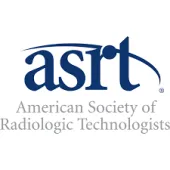
ASRT Category A
This program provides 3.25 hour(s) of Category A continuing education credit for radiologic technologists approved by ASRT and recognized by the ARRT® and various licensure states. Category A credit is also recognized for CE credit in Canada. You must attend the entire program to receive your certificate of completion.
Tuition

| Audience | Price | Early Price | Member Price | Member Early Price |
|---|---|---|---|---|
| Technologist | $69.00 | $65.00 | $62.00 | $59.00 |
Early Pricing Guidelines
Qualifying 'Early' registrations must be made at least 4 days in advance for the program.
Cancellation Policy
Webinars less than 8 hours of credit
Refunds, minus a $15 processing fee, will be granted for cancellations received at least 3 days prior to the program. Cancellations received within 3 days of the webinar will receive a credit toward a future MTMI program, minus the $15 processing fee. No refunds will be made after the webinar starts. MTMI reserves the right to cancel any scheduled program because of low advance registration or other reasons. MTMI’s liability is limited to a refund of any program tuition paid. WEBINAR ATTENDEES that cannot log in due to unsolvable technical issues beyond their control will be eligible for a full refund.

